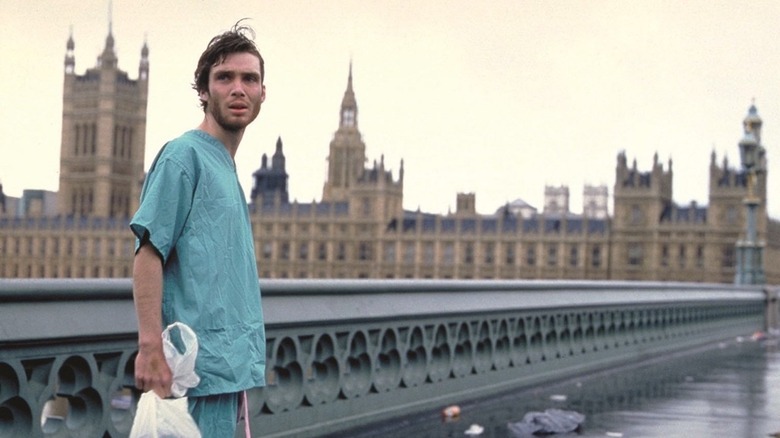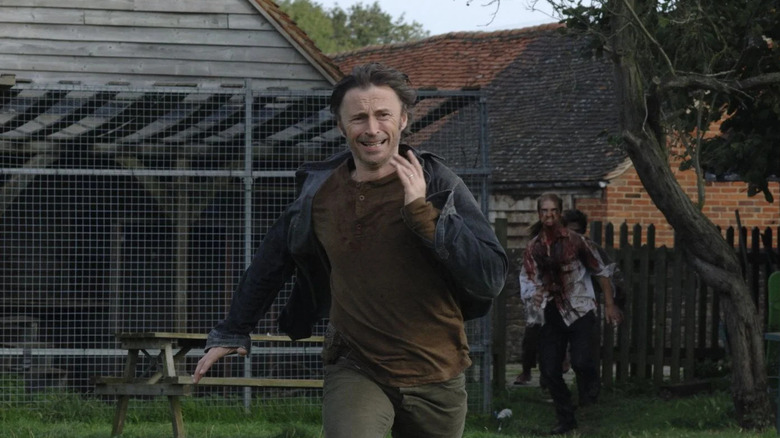Danny Boyle Wants To Make 28 Months Later, And Alex Garland Has Written The Script
"28 Days Later" changed the game for zombie movies. Danny Boyle's 2002 horror film came at a time when the genre was blindly ambulating through the motions. The Godfather of the Dead's offerings ("Land of the Dead" and "Diary of the Dead") wouldn't arrive until the latter half of the aughts, and those movies paled in comparison to his previous undead classics ("Night of the Living Dead," "Dawn of the Dead," and "Day of the Dead"). Alex Garland's crisp horror script features meaner and more immediately threatening zeds, feral in their movements (but it wasn't the first instance of sprinting zombies; for that, see "Nightmare City") as their "rage virus" spreads throughout England 28 days after its outbreak from a lab. It's an intense story that argued the merits of social distancing long before such measures became a real-life necessity.
The virus itself still polarizes horror fans, the nerdier of whom bellow that it's not a zombie movie proper because the infected victims don't die of their wounds before turning into monsters — one of the film's most devastating infection-deaths happens as the result of a single drop of blood from a bird's beak. Thanks to its heart, a dynamite cast, its menacing monsters, and an incredible score by John Murphy, the movie tidied up well at the box office, scoring $82.7 million worldwide on its $8 million budget. The Boyle-free 2007 sequel grossed $64 million against a $15 million budget, and Boyle has been intermittently teasing a third entry ever since.
In an interview with NME Magazine, he said:
"I'd be very tempted [to direct it]. It feels like a very good time actually. It's funny, I hadn't thought about it until you just said it, and I remembered 'Bang, this script!' which is again set in England, very much about England. Anyway, we'll see ... who knows?"
We have a will, but is there a way?
We're still a long way from "28 Months Later" coming to the big screen, despite Boyle's enthusiasm. Theatrical box office numbers faltered during the pandemic, and in the fallout, studios found themselves re-evaluating their distribution model, oscillating between theatrical exclusivity and hybrid streaming. Warner Bros. Discovery CEO David Zaslav recently committed to pivoting back to exclusively releasing movies in theaters rather than on HBO Max, but a supportive studio is only one of the hurdles for a movie to get an international release. These days, Boyle laments, a story's got to have superheroes, space operas, or hotshot aviators to get the average moviegoer's attention.
"It might come back into focus because one of the things that's happening in the business at the moment is it has to be a big reason for you to go to the cinema, because there are less and less reasons," Boyle told NME. "It's hard for companies distributing films and for cinema chains to show films, they're struggling to get people into the cinema unless it's something like 'Top Gun: Maverick' or a Marvel. But a third part would get people in, if it was half-decent."
Another high-grossing industry giant — who has made a few Marvels, himself — echoes Boyle's sentiments. In an interview with Variety, "The Gray Man" writer and co-director Joe Russo dropped an opinion bomb on antiquated theatrical distribution: "I don't know that the market is going to be able to support art-house films the way that it did in the past."
"28 Months Later" certainly wouldn't be an art-house masterpiece, but getting a sequel to a much-hyped zombie franchise might be enough to bring moviegoers back.

